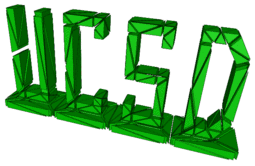| Michael Holst | ||
| https://ccom.ucsd.edu/~mholst/ |
Distinguished Professor of Mathematics and Physics UC San Diego |
|
|
Math 273B (Advanced Techniques in Computational Mathematics)
Course Topics: Mathematical and Computational Tools for Elliptic Partial Differential Equations Instructor: Prof. Michael Holst (5739 AP&M, mholst@math.ucsd.edu) Term: Winter 2014 Lecture: 1:00p-1:50p MWF, APM 2402 Class webpage: http://ccom.ucsd.edu/~mholst/teaching/ucsd/273b_w14 Textbook(s): I. Stakgold and M. Holst, Green's Functions and Boundary Value Problems. John Wiley & Sons, New York, NY, Third Edition, 877 pages, 2011. CATALOG DESCRIPTION: 273B. ADVANCED TECHNIQUES IN COMPUTATIONAL MATHEMATICS (4) Brief review of tools from nonlinear functional analysis for numerical treatment of nonlinear PDE. Numerical continuation methods, pseudo-arclength continuation, gradient flow techniques, and other advanced techniques in computational nonlinear PDE. Project-oriented; projects designed around problems of current interest in science, mathematics, and engineering. Prerequisites: consent of instructor. GRADES, HOMEWORKS, EXAMS, AND IMPORTANT DATES: Your grade in the course is based on your project and your 20-minute project presentation during the time of the final.
GENERAL THEME OF THE COURSE: Math 273ABC was designed as part of an NSF CAREER Award to be a new type of project-oriented course on the foundations of computational mathematics and physics. The main idea of the course is that each participant (including the instructor!) picks a topic of particular interest to his/her own research program, involving the analysis and/or numerical solution of an elliptic (or parabolic) partial differential equation. By attending the lectures and also pursuing their own projects, each participant will gain some mastery of the technical tools for analyzing their particular mathematical model using modern PDE methods (is their model well-posed?), for choosing a "good" discretization method (is the method guaranteed to give the right answer to some known precision?), and for designing algorithms for solving the resulting discrete problem on a workstation or possibly a large cluster (does the algorithm have reasonable complexity, and does it scale on a cluster?). The instructor's particular project this quarter is to analyze and solve a coupled nonlinear elliptic system that arises in mathematical and numerical general relativity; the application is to gravitational wave simulation, and is relevant to NSF's LIGO project. (This problem is the main focus of the instructor's current NSF FRG Project.) SCHEDULE OF LECTURES: We will cover the three major topics listed below. The three major topics will each take about three weeks of the quarter. The individual sub-topics listed within each of the major topics will be covered in varying degree, depending on the available lecture time and the interests of the students. My aim in choosing the topics for the lectures was to provide a general set of mathematical and computational tools for partial differential equations, for mathematicians, scientists, and engineers who want to have a toolkit for doing state of the art computational science. (A secondary aim is to make all of us stronger overall applied mathematicians!)
|
